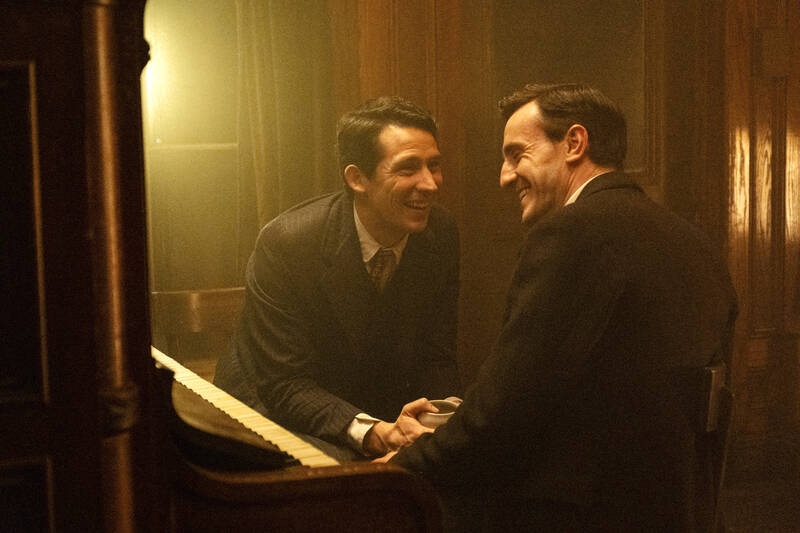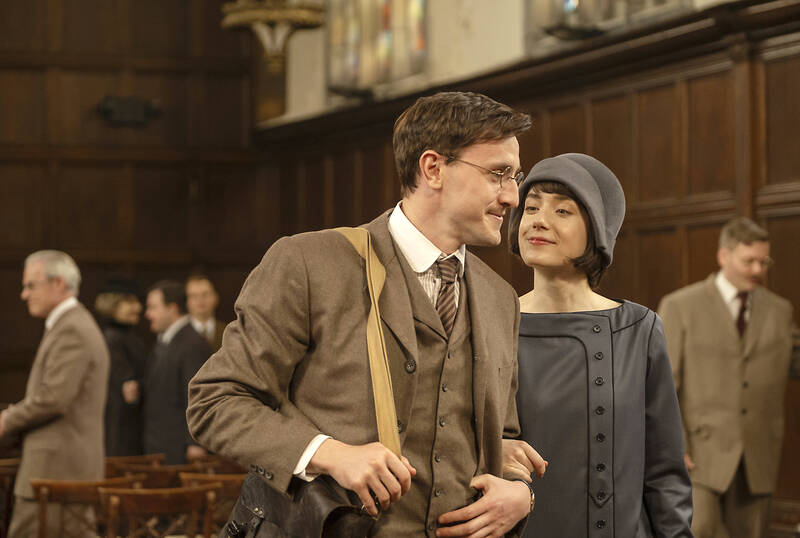If the algorithm was overseeing casting for a tender, queer romance, it’s likely that at least one combination would involve Paul Mescal and Josh O’Connor. They are two of Hollywood’s most promising next generation stars, and, not insignificantly, Internet boyfriends who have captured the popular imagination on and off screen.
The new film The History of Sound does indeed find Mescal and O’Connor in a romantic affair. But it is not remotely the stuff of Normal People meets Challengers fan fiction (thank goodness for that). It’s a silly thing to have to clarify, but posters, loglines, red carpet appearances and wild imaginations can sometimes give audiences a misleading idea about what a movie really is. In this case, The History of Sound is a lyrical meditation on fleeting first love and the questions that can follow and haunt for a lifetime.
Mescal is Lionel, a music prodigy from an impoverished Kentucky farm family whose talent lands him at the Boston Conservatory where, in 1917, he meets David (O’Connor) who happens to be singing a folk song that reminds him of home. It’s a mystical kind of meet-cute, in which all sounds evaporate as Lionel floats over to this magnetic person. David, however, is from a different world than Lionel, the product of a wealthy Newport family stricken by tragedy and death. And yet despite all the losses around, he has an undeniable lightness to him and a charisma that Lionel, and most who meet him, find intoxicating. Despite their ivory tower surroundings, they’re both passionate about folk music. Though prewar America was not exactly a welcoming time for gay men, Lionel and David fall into an easy, intimate relationship, and the movie comes vibrantly, ever so briefly, to life.

Photo: AP
The History of Sound, an adaptation of a short story by Ben Shattuck, was directed by Oliver Hermanus, whose deliberately languorous pacing is admirably restrained but can also veer into tedium. Part of that is surely intentional as it’s a film about Lionel’s longing and searching in the absence of David, who is cruelly (for us and Lionel) gone for a large part of the movie.
The two reunite for a bit, in Maine, on a quest to record folk songs. They wander around, sleep in tents and Lionel is once again in heaven. But David has changed a bit, and most of the important things go frustratingly unsaid. Between the Conservatory and Maine, David served in the war, in the trenches, but can’t quite bring himself to talk meaningfully about it, resorting only to the quips he has always relied on: “It was boring.”
Not long after, they’re separated again, and the camera keeps us stubbornly with Lionel who finds himself in some of the most beautiful places in the world, singing in a choir in Rome, or on a weekend away at his girlfriend’s family’s Downton-esque estate in England. And yet all he yearns for is to be in that tent, in Maine, with David by his side.

Photo: AP
At its core, The History of Sound a memory piece, narrated by Chris Cooper, who plays an older Lionel still trying to make sense of it all. The filmmakers have said it’s about the idea that your first love is your greatest love, which is a thought so unspeakably sad that it seems only fitting for a folk song. Add to that a generation of men destroyed by war, and the repression of the time and it’s enough to make you crumble under the weight of it all.
The film, which runs over two hours, is building to a profound conclusion, a payoff for all the slow-paced and melancholy moments that preceded it. But it requires definite patience from its audience that it doesn’t necessarily earn just by existing. There’s a lot of talk about what makes folk songs great, that they’re the most “warm-blooded pieces of music” and are the songs of real people, not gods. Lionel explains at one point that they are “messy, human experiences,” “emotion in song,” “nothing fancy.”
The History of Sound does not feel like a folk song, however, just the inspiration for one.

The Lee (李) family migrated to Taiwan in trickles many decades ago. Born in Myanmar, they are ethnically Chinese and their first language is Yunnanese, from China’s Yunnan Province. Today, they run a cozy little restaurant in Taipei’s student stomping ground, near National Taiwan University (NTU), serving up a daily pre-selected menu that pays homage to their blended Yunnan-Burmese heritage, where lemongrass and curry leaves sit beside century egg and pickled woodear mushrooms. Wu Yun (巫雲) is more akin to a family home that has set up tables and chairs and welcomed strangers to cozy up and share a meal

Dec. 8 to Dec. 14 Chang-Lee Te-ho (張李德和) had her father’s words etched into stone as her personal motto: “Even as a woman, you should master at least one art.” She went on to excel in seven — classical poetry, lyrical poetry, calligraphy, painting, music, chess and embroidery — and was also a respected educator, charity organizer and provincial assemblywoman. Among her many monikers was “Poetry Mother” (詩媽). While her father Lee Chao-yuan’s (李昭元) phrasing reflected the social norms of the 1890s, it was relatively progressive for the time. He personally taught Chang-Lee the Chinese classics until she entered public

Last week writer Wei Lingling (魏玲靈) unloaded a remarkably conventional pro-China column in the Wall Street Journal (“From Bush’s Rebuke to Trump’s Whisper: Navigating a Geopolitical Flashpoint,” Dec 2, 2025). Wei alleged that in a phone call, US President Donald Trump advised Japanese Prime Minister Sanae Takaichi not to provoke the People’s Republic of China (PRC) over Taiwan. Wei’s claim was categorically denied by Japanese government sources. Trump’s call to Takaichi, Wei said, was just like the moment in 2003 when former US president George Bush stood next to former Chinese premier Wen Jia-bao (溫家寶) and criticized former president Chen

President William Lai (賴清德) has proposed a NT$1.25 trillion (US$40 billion) special eight-year budget that intends to bolster Taiwan’s national defense, with a “T-Dome” plan to create “an unassailable Taiwan, safeguarded by innovation and technology” as its centerpiece. This is an interesting test for the Chinese Nationalist Party (KMT), and how they handle it will likely provide some answers as to where the party currently stands. Naturally, the Lai administration and his Democratic Progressive Party (DPP) are for it, as are the Americans. The Chinese Communist Party (CCP) is not. The interests and agendas of those three are clear, but